|
|
|
Sort Order |
|
|
|
Items / Page
|
|
|
|
|
|
|
| Srl | Item |
| 1 |
ID:
168483
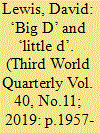

|
|
|
|
|
| Summary/Abstract |
Confusion between the idea of development as purposeful intervention and development as outcome has been addressed by efforts to distinguish ‘intentional’ from ‘immanent’ development, and the distinction between ‘big D’ development as Western post- World War Two modernisation in the Global South, and ‘little d’ as the creation of winners and losers within unfolding capitalist change. As a heuristic device this distinction has been put to a variety of uses within development studies, but it has rarely been subjected to further scrutiny. This paper asks (1) whether the distinction remains coherent or risks being stretched too far, and (2) whether it remains relevant within the changing landscape of twenty-first century development. It first traces the historical evolution of the distinction, and then presents an exploratory case study of Bangladesh’s garment sector in order to analyse the relationship between the two kinds of development empirically, identifying a number of contradictions and ambiguities. It finds that while the ‘D/d’ distinction remains useful at a general level, further conceptualisation is now needed, and its relevance may fade as the significance of Western aid declines.
|
|
|
|
|
|
|
|
|
|
|
|
|
|
|
|
| 2 |
ID:
066746
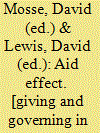

|
|
|
|
|
| Publication |
London, Pluto Press, 2005.
|
| Description |
vi, 223p.
|
| Series |
Anthropology, culture and society
|
| Standard Number |
0745323863
|
|
|
|
|
|
|
|
|
|
|
|
Copies: C:1/I:0,R:0,Q:0
Circulation
| Accession# | Call# | Current Location | Status | Policy | Location |
| 050388 | 306.3/MOS 050388 | Main | On Shelf | General | |
|
|
|
|
| 3 |
ID:
147197
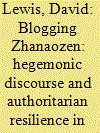

|
|
|
|
|
| Summary/Abstract |
Post-Soviet authoritarian regimes – particularly in Central Asia – have proved highly resilient since independence. Existing explanations for regime longevity should be augmented by consideration of non-material, discursive sources of political legitimacy. A robust authoritarian regime requires the production and circulation of a hegemonic discourse that is internalized by influential social groups. This type of dominant discourse has emerged in Kazakhstan, making it difficult for political opponents to promote alternative political imaginaries and mobilize popular support. State control over media is challenged by Internet-based platforms, but in Kazakhstan social media and blogging have also offered an opportunity for the regime to reproduce its own hegemonic discourse. This article uses a discourse analysis of posts by bloggers in the aftermath of a violent conflict in Zhanaozen in Kazakhstan in 2011 to demonstrate how central elements in the state discourse are reproduced online, even by independent bloggers, suggesting that an official discourse has the ability to maintain its hegemonic status despite widespread use of blogs and social media.
|
|
|
|
|
|
|
|
|
|
|
|
|
|
|
|
| 4 |
ID:
184968
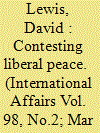

|
|
|
|
|
| Summary/Abstract |
Russia has begun to promote itself internationally as a mediator of conflict and as a ‘peacemaker’. Russian officials cite its extensive experience in managing numerous post-Soviet conflicts and its more recent experience of intervention in civil wars in Syria, Libya, the Central African Republic (CAR) and Nagorno-Karabakh. Russia considers all these activities forms of ‘peacemaking’, but its approach differs radically from the model of liberal peacebuilding that has dominated international practice in the post-Cold War era. It prioritizes authoritarian stability over justice, human rights and democracy and advocates short-term goals of conflict management over long-term goals of conflict resolution. In this article I explain why Russia's norms of peacemaking and conflict management diverged so markedly from liberal peacebuilding norms. I argue that Russia is no longer simply contesting western norms, but developing its own distinct model of conflict management. This model accepts the use of force as an integral element in peacemaking, engages in ‘coercive’ mediation by authoritative actors, and views the West as a geopolitical and normative opponent. This debate over Russia's approach to peace and conflict also offers wider insights into how Russia challenges the norms and practices that underpin the liberal international order.
|
|
|
|
|
|
|
|
|
|
|
|
|
|
|
|
| 5 |
ID:
081217


|
|
|
|
|
| Publication |
2008.
|
| Summary/Abstract |
The three-sector model-encompassing the private, public and non-governmental or 'third' sectors-is important to much of the research that is undertaken on development policy. While it may be analytically convenient to separate the three sectors, the realities are more complex. Non-governmental actors and government/public sector agencies are linked in potentially important (though often far from visible) ways via personal relationships, resource flows and informal transactions. This paper seeks to understand these links by studying the 'life-work histories' of individuals who have operated in both the government and third sector. Two main types of such boundary crossing are identified: 'consecutive', in which a person moves from one sector to the other in order to take up a new position, and 'extensive', in which a person is simultaneously active in both sectors. Drawing on a set of recently collected life-work history data, the paper explores the diversity of this phenomenon in three countries. It examines the reasons for cross-over, analyses the experiences of some of those involved, and explores the implications for better understanding the boundaries, both conceptual and tangible, that both separate and link government and third sector in these different institutional contexts.
|
|
|
|
|
|
|
|
|
|
|
|
|
|
|
|
| 6 |
ID:
085530


|
|
|
|
|
| Publication |
2008.
|
| Summary/Abstract |
This contribution argues that analysis of the overthrow of President Askar Akaev in Kyrgyzstan in 2005 has tended to overemphasize external factors in the revolution, while underplaying local dynamics, which were complex, difficult to understand, and did not fit with a much simpler narrative of democratic change, inspired by external encouragement. In reality, popular discontent, mobilized by local elites in their support during a highly competitive electoral process, led to elite defection and cross-regional political alliances that severely undermined the Akaev regime. International engagement, and Western-funded NGOs and civil society groups played a much more marginal role than is normally portrayed. For the most part, Western groups engaged with an almost 'virtual' sphere of politics, in which NGOs and democracy groups predominated, but where there was little ability to influence the real world of the Kyrgyz polity.
|
|
|
|
|
|
|
|
|
|
|
|
|
|
|
|
| 7 |
ID:
105029
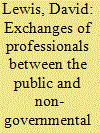

|
|
|
|
|
| Publication |
2011.
|
| Summary/Abstract |
Using recently-collected ethnographic life history data, this paper analyses in historical context the shifting boundary between governmental and non-governmental 'worlds' in Bangladesh. First, the paper explores the ways in which this boundary is an ambiguous one, and aims to show how it is constructed and maintained, through an analysis of new types of 'boundary-crossing' professionals who cross between the two sectors in the course of their career trajectories and their social relationships. Second, it suggests that such movements across this boundary throws light on changing professional identities in Bangladesh, such as what it means to work as a public servant or a development worker. High-achieving university graduates are now less likely to choose civil service careers than they once were, because new opportunities exist for them to work more flexibly as 'non-governmental professionals' in roles that may allow them to combine professional, consultant and activist identities.
|
|
|
|
|
|
|
|
|
|
|
|
|
|
|
|
| 8 |
ID:
053614
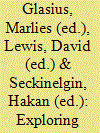

|
|
|
|
|
| Publication |
London, Routledge, 2004.
|
| Description |
x, 213p.
|
| Standard Number |
0415325455
|
|
|
|
|
|
|
|
|
|
|
|
Copies: C:1/I:0,R:0,Q:0
Circulation
| Accession# | Call# | Current Location | Status | Policy | Location |
| 048595 | 300/GLA 048595 | Main | On Shelf | General | |
|
|
|
|
| 9 |
ID:
094714


|
|
|
| 10 |
ID:
168479
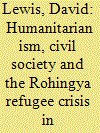

|
|
|
|
|
| Summary/Abstract |
This paper reflects on responses to Bangladesh’s Rohingya refugee crisis in the weeks that followed the increased numbers of Rohingya refugees who arrived from Myanmar after 24 August 2017. Drawing on literature on the local and international dimensions of humanitarianism, and the analytical lens of performance, it explores narratives of helping in relation to the shifting character of Bangladesh’s civil society, changing expressions of local and international religious sentiments, and the importance of understanding both formal and informal responses historically in the context of Bangladesh’s own experiences as a country born from a crisis in which citizens became refugees fleeing state-sponsored violence.
|
|
|
|
|
|
|
|
|
|
|
|
|
|
|
|
| 11 |
ID:
162435
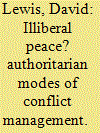

|
|
|
|
|
| Summary/Abstract |
In a contested international order, ideas of liberal peacebuilding are being supplanted by state-centric, authoritarian responses to internal armed conflicts. In this article we suggest that existing research has not yet sufficiently recognised this important shift in conflict management practice. Scholarship in peace and conflict studies has avoided hard cases of ‘illiberal peace’, or categorises them simply as military victories. Drawing on accounts of state responses to conflicts in Russia, Sri Lanka, China, Ethiopia, Rwanda and Turkey, we develop an alternative conceptual framework to understand authoritarian conflict management as a form of wartime and post-conflict order in its own right. Although violence is central to these orders, we argue that they are also dependent on a much wider range of authoritarian policy responses, which we categorise in three major domains: firstly, discourse (state propaganda, information control and knowledge production); secondly, spatial politics (both military and civilian modes of controlling and shaping spaces); and thirdly, political economy (the hierarchical distribution of resources to produce particular political outcomes). In conclusion, we propose a research agenda that moves on from discussions of liberal peace to examine hard cases of contemporary conflict and conflict management.
|
|
|
|
|
|
|
|
|
|
|
|
|
|
|
|
| 12 |
ID:
119223
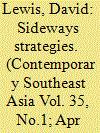

|
|
|
|
|
| Publication |
2013.
|
| Summary/Abstract |
Studying individuals who move from civil society into government in an effort to pursue reform agendas provides important "bottom up" insights into the complexity of policy processes. Using a set of original life history data collected in the Philippines, this article analyses the experiences of such crossover reformist efforts in post-Marcos Philippines in the field of agrarian reform. Taking each of the four governments of the period in turn, a set of themes are discussed including entryism as a political strategy, political patronage, organizational culture, role transitions and activist identities. The article concludes with the idea that the boundary between state and civil society is an important, relatively unexplored area of political activity. By opening up this area as an arena of contentious politics, an ethnographic approach tells us more about the challenges and complexity encountered by those attempting to influence policy processes from the inside, and about the policy process itself as a non-linear phenomenon.
|
|
|
|
|
|
|
|
|
|
|
|
|
|
|
|
| 13 |
ID:
114454
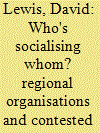

|
|
|
|
|
| Publication |
2012.
|
| Summary/Abstract |
The Organization for Security and Cooperation in Europe (OSCE) and the Shanghai Cooperation Organisation (SCO) represent competing sets of international norms in Central Asia. The contestation between these sets of norms has not led to a complete polarisation between members of the two organisations, however. Instead, the OSCE has used a range of discursive tactics to reduce political contestation, downplaying some contested issues and seeking shared discourses on security threats. This article explores these tactics and suggests that these discursive shifts may eventually threaten the normative identity of the OSCE and lead to the acceptance of a more hybrid set of security-related norms in the region.
|
|
|
|
|
|
|
|
|
|
|
|
|
|
|
|
|
|
|
|
|